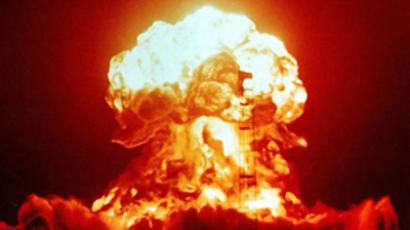Nuclear summit addresses a post-Cold War world
From the start, the Nuclear Security Summit hosted by US President Barack Obama indicated that the threats facing the world have changed dramatically.
“If one of those terrorist groups – instead of using high explosives, or machine guns, uses a nuclear weapon and explodes that into a major city – like Moscow, you get hundreds of thousands or millions of casualties.While a large scale nuclear war between Russia and the U.S. is not feasible any more, it is feasible that a terrorist group get can get hold of a nuclear bomb,” said John Isaacs, Executive Director of the Center for Arms Control and Non-Proliferation.
Many experts say that if a nuclear attack were to take place in this day and age, it would come from terrorists and not a specific country. Coming up with steps to make sure this can’t happen is exactly the goal of this summit.
Leaders from over 40 countries are set to agree on steps that would ensure that terrorists can’t lay their hands on the nuclear stockpiles that can be found all over the world. Access to them can be locked by safeguarding unsecured uranium and plutonium stockpiles.
“Back in the 1960s, there was a tendency to export materials like these – like highly enriched uranium – to a lot of countries around the world – to their research reactors – now we are trying to get that back and trying to secure them,” said Hans Kristensen of the Federation of American Scientists.
However, some of the countries that will be most directly affected by the decisions made at the summit were not invited to attend. The two countries whose nuclear programs are seen as a threat to others – Iran and North Korea – are nowhere to be seen at this summit.
"This is more an issue for countries that have fissile materials – uranium and plutonium, not necessarily about those countries that have nuclear weapons or about to get them," said Kristensen.
Even though thousands of reporters signed up to cover the summit, many of the details of what goes on could remain in the shadows as most of the meetings are held behind closed doors. The secrecy is partially due to the sensitivity some countries have towards the nuclear material issue. Israeli Prime Minister Benjamin Netanyahu pulled out of the summit at the last minute for fear that
Israel’s rumoured nuclear program would be attacked.
“I think it’s a sign that Israel is trying to avoid confrontation with the Muslim and Arab on these themes, clearly. It didn’t want to be confronted or accused of something,” said journalist Emilio Ricardi
The meeting is expected to produce an agreement, although its effect will be limited.
“We know all the results more or less," said Ricardi. "That there is a broad agreement to avoid nuclear material could finish in the hands of terrorists, like Al Qaeda and other groups. On that there is a broad agreement so I don’t think that much will happen.”
Step 1 of the agreement to be signed is a plan that will secure fissile material all over the world within the next four years. Step 2 requires all countries to bring something to the table by promising a specific commitment to others. If agreements are followed, analysts say it will mean a huge leap forward to at least a decrease of the odds of a terrorist nuclear attack.













